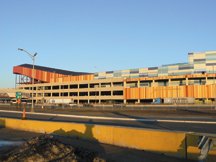It was abandoned by construction crews more than a year ago. The recession and collapse on Wall Street left its financing in shambles. And its exterior design has been likened to a giant stack of shipping containers or Lego blocks.
But Xanadu, the $2.3 billion retail/sports/entertainment complex on Route 3 in East Rutherford, may have a new lease on life.
Just 10 months ago, the long-stalled project northwest of Secaucus appeared to be doomed. But on Tuesday a consortium of five lenders announced that it had taken control of Xanadu from Colony Capital, a private equity firm that had been developing the project.
“The previous owners and the lender group entered into a forbearance agreement, which, amongst other things, included a consensual transfer of control of the project to the lender group if specific milestones were not met,” Michael Beckerman, a spokesman for the consortium, told the Reporter last week. “The deadline in this forbearance agreement was Aug. 9, 2010.”
It’s unclear which of Xanadu’s original attractions will be included in its new incarnation.
________
The consortium is being advised by Sills Cummis & Gross, Weil Gotshal & Manges, LLP, and Moelis & Co., an investment bank, according to a statement released Tuesday.
Hurt by recession
Originally planned as a bold, large-scale entertainment Mecca, Xanadu has yet to live up to its hype.
The 4.8 million square foot complex was designed to feature five theme-oriented shopping and entertainment districts. Envisioned to be a cross between an indoor theme park and a mall, Xanadu was supposed to feature a 287-foot Ferris wheel, an aquarium, an indoor snow dome for skiing, two skydiving tunnels, movie theaters, and up to 200 stores packed into its 2.3 million square feet of retail space.
It was also expected to fuel the local economy, adding 20,000 temporary jobs during the construction phase and another 20,000 permanent jobs once completed.
In 2008 the Cheesecake Factory, Benihana, Legoland, and Cabela’s all signed agreements to open at Xanadu and spokespeople for the complex said the complex was about 70 percent leased.
But in March 2009 a subsidiary of Lehman Brothers – which had been one of Xanadu’s financial backers – went bankrupt. The collapse sent the project into a tailspin as the recession also affected other financial supporters of the project. Making matters worse, the recession also hurt Xanadu’s ability to draw struggling retailers and other businesses to the complex.
Colony Capital found itself in need of $500 million to finish the project and Xanadu floundered throughout most of last year, although significant construction of the complex was completed.
‘World-class entertainment, retail’
Yet, Colony never found the financing it needed and now Xanadu’s remaining financial backers have stepped in to take control.
Working with New York-based Related Companies and Gov. Chris Christie’s Gaming, Sports, and Entertainment Advisory Commission, the consortium has vowed to repackage Xanadu, complete construction, and get it opened to the public.
“The lender group is currently negotiating with several world-class entertainment and retail operators that have the financial resources as well as the leasing and development expertise necessary to successfully complete a project of this magnitude,” Beckerman said last week. “The lender group will work closely with the new developers to evaluate all operational considerations with regard to the project.”
He declined to state which, if any, of Xanadu’s original planned attractions – the snow dome, the aquarium – will be included in its new incarnation.
But the consortium has promised to redesign Xanadu’s striped exterior, hated by many, and “rebrand” the development, a sign that could mean the very name “Xanadu” might be scrapped.
The consortium is now Xanadu’s third financial backer.
Originally expected to be financed by the Maryland-based Mills Corp., Xanadu ended up being backed by Colony Capital after it became apparent that Mills wouldn’t be able to finance the project as planned. Colony Capital took over in August 2006.
E-mail E. Assata Wright at awright@hudsonreporter.com.
